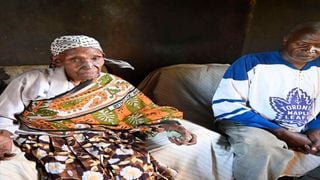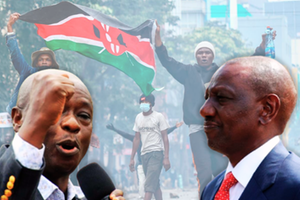
The family of hyena-attack victim Joseph Njuguna Kamau — his mother Margret Kamau and brother Fredrick Kahuha — during the interview at their home in Komu, Thika, on January 3, 2022. Police took away Kamau’s remains that had been kept at the home since the attack in 2017.
News
Premium
Village gripped by fear as a cackle of marauding hyenas attack, kill at will
What you need to know:
- Villagers have resorted to locking their cattle in houses, with family members staying alert all night to guard them.
- Besides humans and cattle, even dogs are at risk, especially puppies, and residents must lock their young dogs in the house.
Early one morning in March 2017, Frederick Kahuha received a call from grieving fellow villagers, informing him that his brother had been killed by hyenas.
They had gathered around a bloody scene with scattered torn clothes and bones, the only remains of Joseph Njuguna Kamau, 64.
They could see the footprints of the beasts. With other villagers, they went deeper into the forest and found more bones. That evening, the area’s police station commander visited the home and carried away Kamau’s clothes, boots and some of the bone fragments.
Kahuha and Kamau’s father, Kamau Njuguna alias Raymond, kept his son’s bones in a locked wooden box under his bed in his two-room house.
The next day, villagers went on another search in the forest and found Kamau’s skull and other bone fragments. Detectives took away the skull while other bone fragments were stored in the box.
For a year, Njuguna slept with his son’s remains under his bed and, when he died, the bones remained in the house. He had only one wish — that his son be given a decent burial even though it wouldn’t make up for his brutal death.
On Monday, January 3, more than four years later, crime and forensic investigators from the Directorate of Criminal Investigations homicide unit took out the bones in body bags, setting the stage for Kamau’s burial.
Mr Kahuha, 52, says his brother had left home to herd the family’s cattle in the nearby forest. At 4pm, their father went to collect his cattle and left his son chopping firewood. It was the last time he would see his first-born.
The hyena problem
Because Kamau was known to love his bottle and had no phone, his family didn’t worry about finding him, assuming he was in a drinking den with his friends. That was until Mr Kahuha received the bad news.
“A villager found his clothes near where he used to go drinking, and ran home to tell my family, whom I found at the scene. It was devastating,” he says. “We could not bury him because we could not get a burial permit.”
Their mother, Margaret Njeri Kamau, was sick and, when told that her son’s remains had been found, didn’t have the strength to go to the scene. Her heart in pain, she retrieved a picture she had taken with her son and set it on fire.
“I didn’t want to see his picture. I don’t even want to hear tales about his death. I have never stepped in that room where his remains lay even though it’s under the same roof,” she explains.
“I sleep on the chair now, because when I sleep on my bed in my sitting room, I tend to see him in my dreams. Now that government officials have taken his bones, I pray to God that I get to bury him, and for me to live longer.”
Upon their son’s death, she says, her late husband changed. He withdrew into himself and would often be found alone, his face in his palms. He developed high blood pressure and was admitted at Thika Level Five Hospital. He had brain surgery and eventually died a year later. His last wish was for his family to get a permit and lay his son to rest.
But the hyena problem remains. Villagers speak about the burden of adjusting their lifestyles because of the carnivores.
“We have to do our toilet business before sunset, and lock our cattle in houses, with family members staying alert all night to guard them,” says Ms Agnes Waithera, Mr Kahuha’s wife. “We tie up calves in the homestead, and only take older cattle along the road to an open grazing area where it is easier to care for them.”
Because homes are more than 100 metres apart, she says, a scream that signals a hyena attack would get residents’ attention but they are scared of the animals and may not be quick to come to the rescue.
Human-wildlife conflict
“That’s bad, because a hyena only needs a minute to rip you apart and run away with your intestines, she says, adding that, last year, a villager’s remains were found in a nearby quarry as a cackle of hyenas each ran with a piece of him in their mouths. His clothes were scattered everywhere with a trail of blood in circles.
Mr Kahuha recalls that he and his friend were once trailed one evening by nine hyenas for about three kilometres. The beasts only gave up when they saw a cow and attacked it, giving the men a chance to escape.
Mr Stanley Mbugua, a villager and boda boda operator, says he meets groups of hyenas almost daily when he takes his clients to and from Komo village and Makongeni.
“I meet them around 5am and 8pm. When they see you, they move to the side, wait for you to pass then follow you. They are always more than seven, and my only saviour is speeding up, which works for me because they are slow,” he explains.
The hyenas, he says, live in caves in nearby Buffalo Hills. On December 25, as Christians all over the world celebrated Christmas, a villager lost his goat to hyenas in broad daylight, and a woman weeding her maize farm also came face to face with a fleeing hyena. She was lucky not to be attacked.
“A hyena attacked a child last year as he was going to school in the morning. It made away with his school bag but he was saved by villagers who heard him screaming,” says Nyumba Kumi neighbourhood watch member Solomon Kamande.
Besides humans and cattle, he said, even dogs are at risk, especially puppies, and residents must lock their young dogs in the house. Mr Obadiah Kihanya, the community policing chairperson and head of Nyumba Kumi, expressed disappointment at how the government handles cases of human-wildlife conflict.
“Animals are valued in Kenya more than humans. If you are reported to have killed even one hyena, you will be locked up,” he laments.
To give herself closure, the Njuguna family matriarch viewed her first-born son’s remains for the last time, before they were loaded onto a police vehicle and taken to the General Kago Mortuary in Thika.





